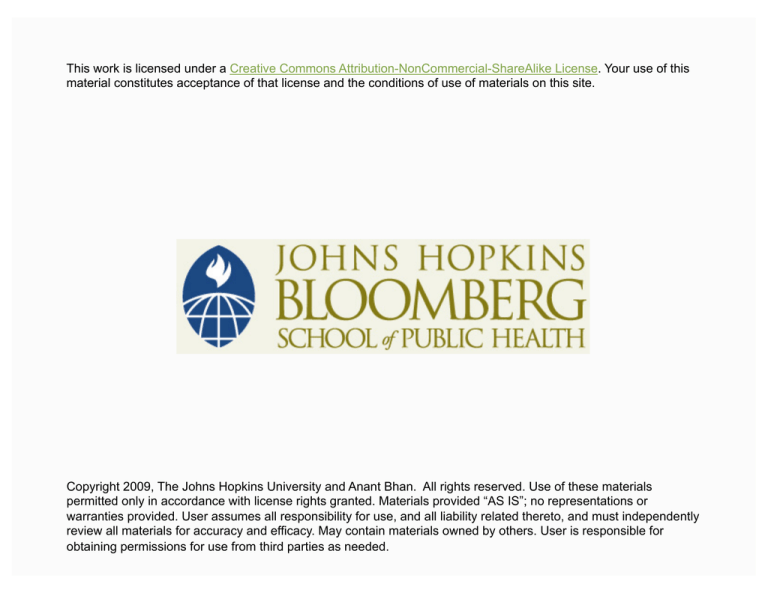
This work is licensed under a Creative Commons Attribution-NonCommercial-ShareAlike License. Your use of this
material constitutes acceptance of that license and the conditions of use of materials on this site.
Copyright 2009, The Johns Hopkins University and Anant Bhan. All rights reserved. Use of these materials
permitted only in accordance with license rights granted. Materials provided “AS IS”; no representations or
warranties provided. User assumes all responsibility for use, and all liability related thereto, and must independently
review all materials for accuracy and efficacy. May contain materials owned by others. User is responsible for
obtaining permissions for use from third parties as needed.
Section C: History of Research Ethics in South Asia
Anant Bhan, MBBS, MHSc
Objectives
Describe the historical context of development of research ethics in
(South) Asia with a focus on India
Discuss contemporary issues in the conduct of research in humans in
the region
3
Ethics in Traditional Medicine
Prime concern—safety and best interest of patients
Cost-effective treatment to the poor
No drastic/costly measure for the incurable
Maintain confidentiality
Refrain from unsavory financial deals
Refrain from advertising
Professionalism with patients and colleagues
Source: Charaka Samhita.
4
Post-independence
Push for enhancing science and technology capacity
Setting up of research institutes through the ICMR, Department of
Science and Technology, and Department of Biotechnology
Research with policy implications carried out, e.g., development of
Directly Observed Treatment Strategy (DOTS) for TB at the National
Tuberculosis Institute
5
Research Controversies: India
Trials on cervical dysplasia in Indian women in the 1970s and 1980s
1990s: Use of antimalarial quinacrine as a terminal contraceptive in
West Bengal
1999: Trial at Regional Cancer Centre in Trivandrum on patients
without DCGI clearance and ethics committee clearance
6
Research Controversies: India
Trials on cervical dysplasia in Indian women in the 1970s and 1980s
1990s: Use of antimalarial quinacrine as a terminal contraceptive in
West Bengal
1999: Trial at Regional Cancer Centre in Trivandrum on patients
without DCGI clearance and ethics committee clearance
Trials in women with injectable contraceptive Net-En with
questionable consent
2003–04: Letrozole (anti-cancer drug) promoted by a pharmaceutical
company surreptitiously as a fertility enhancing drug without
conducting proper research
Placebo-controlled trials in psychiatry, especially in patients with
serious psychiatric conditions
7
Ethics Guidelines: India
1970: Central Council of Indian Medicine Act
1980: ICMR Policy Statement—first official guidelines for
establishment of ethics committees in all medical colleges and
research centers
2000: Ethical Guidelines for Biomedical Research on Human Subjects
(revised 2006)
2000: Ethical Guidelines for Social Science Research in Health (nongovernment)
2001: Indian GCP Guidelines
2002: Medical Council of India Code of Medical Ethics
2007: Stem Cell Research Guidelines (with Department of
Biotechnology)
8
Acts Governing Drugs and Cosmetics in India
Acts and rules which govern the manufacture, sale, import, export,
and clinical research of drugs and cosmetics in India
- The Drugs and Cosmetics Act, 1940
- The Pharmacy Act, 1948
- The Drugs and Magic Remedies (Objectionable Advertisement)
Act, 1954
- The Narcotic Drugs and Psychotropic Substances Act, 1985
- The Medicinal and Toilet Preparations (Excise Duties) Act, 1956
- The Drugs (Prices Control) Order 1995 (under the Essential
Commodities Act)
9
Role of NGOs and Activists
Raising questions and concerns around medical practice and also
research
- MTP Act
- PCPNDT Act
- Critique of current Assisted Reproductive Technologies
(Regulation) Bill and Rules 2008
- Need for stricter regulation of research in the country
10
Institutional Level
As institutions become more autonomous, conflicts of interest arise
because of funding
Issues around responsible conduct of research: authorship
- “Polyauthoritis giftosa”
- Plagiarism
11
Stem Cell Research and Therapy
Clinics offering “magic” cures, conducting research in stem cell
therapy raising difficult questions
Requires caution given possibility of risk associated with these
therapies
g
12
Hwang Case: South Korea
Falsifying research results—faked stem cell lines
Coercion of juniors in the lab
Submitting false findings to journals
13
The News, Karachi (September 11, 2005)
Slide courtesy or Dr. Aamir Jafarey, CBEC, SIUT, Pakistan.
14
Sri Lanka
Controversy around research carried out post-tsunami in those
affected and vulnerable
Ethics of post-disaster research
Sumathipala A, Sirribaddana S. Research and clinical ethics after the
tsunami: Sri Lanka. Lancet 2005;366:1418-1420
15
Current Challenges
Growing amount of research in sciences and social sciences
Outsourced clinical trials
Research in new frontiers of medicine, like regenerative medicine
and nanotechnology
Regulatory oversight needs to be more robust
Need for training in research and for embedding ethics in research
16
Outsourced Clinical Trials
Linked to cost cutting by global big pharma
Mushrooming of CROs in the country
Ineffective regulation and poorly staffed drug controller’s office
Pro-industry steps by government
Ethics committees exist, but often there is no training and no
registration or accreditation process
Commercial or for-profit ethics committees coming up
17
Need for Trainings in Research Ethics
Workshops and trainings being conducted in various parts of the
country
ICMR Fogarty grant for long-term bioethics training
Need for more contextual research in the area
Discussions happening through forums such as the Indian Journal of
Medical Ethics (www.ijme.in)
18




